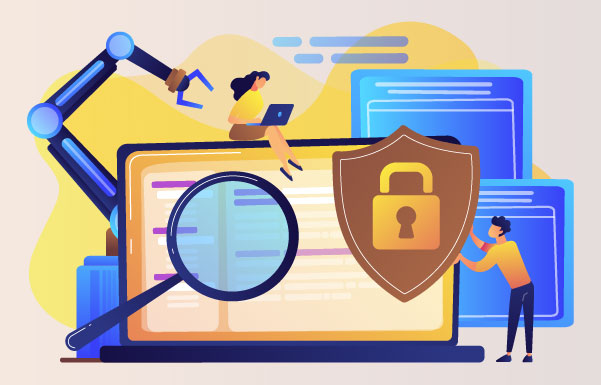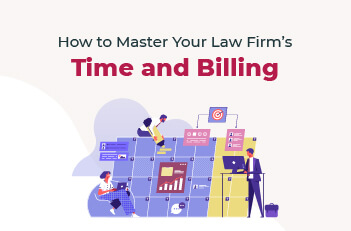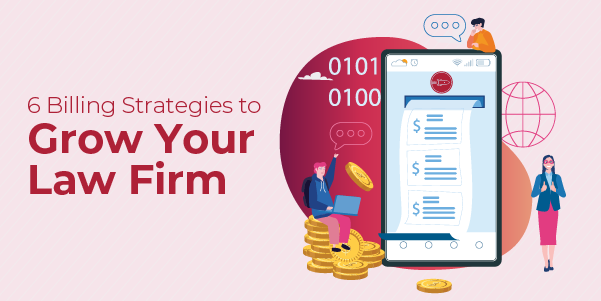Cybersecurity for Law Firms: Protecting Sensitive Data in the Digital Age

Cybersecurity is more critical now than ever before. Not only are law firms storing more data, but since the pandemic has forced us all to become increasingly mobile, keeping clients’ sensitive information safe is even more challenging.
So, what can you do? It’s important to educate yourself and your colleagues on cybersecurity to ensure that your law firm data is properly managed (After all, you are only as strong as your weakest link.)
11 Tips for Effective Law Firm Data Protection
As a law firm, protecting your clients' sensitive information should be at the top of your priority list. To help you out, here are 11 key tips that can boost your law firm's data protection and keep confidential information safe and sound.
1. Make sure all devices are protected with a password or passcode.
One of the most basic rules of cybersecurity in law firms, especially where sensitive client information is involved, is to protect your mobile devices with a password or passcode. This includes both your computers and mobile devices. This way, if your device gets lost or stolen, it will be much harder for anyone to access your sensitive information.
At the very least, your phones and computers should require a login password or passcode. Additionally, you should be setting the screen to lock automatically after a certain amount of inactivity. On your phone, this may be a minute or two. There are security settings for computers that will lock your machine once the screensaver turns on, requiring your password to unlock it. We highly suggest doing this.
If possible, try to avoid those “drag a pattern with your finger” passcodes. If a malicious actor were to hold your screen up to the light at a certain angle, the path traced over and over again by your finger might be visible.
2. Use strong passwords.
The two most common passwords in America, year in and year out, are “123456” or “password,” which is a significant problem for law firms handling confidential information. Every year, they jockey for first and second place. Between those two and a user’s birth or anniversary date, you have a solid shot of guessing someone’s password. This is a cybersecurity nightmare!
We all get nagged about passwords and are familiar with the basic rules: use upper and lowercase characters, numbers, and punctuation. But there are ways you can make a password even stronger: You can have a “base” password that you extend uniquely for each site you visit. For example, perhaps your passwords always start with M@ry4, but for your bank it’s M@ry4Bank! and for your email it’s M@ry4Email!.
And don’t worry about complicated passwords—a password manager like LastPass or 1Password will help you keep track of things.
To help manage these complex passwords securely, use Rocket Matter's contact management feature, which allows you to store sensitive client information safely while keeping track of unique credentials for different accounts.
Ultimate Guide to Law Firm Business Intelligence
Are you sure about running a law firm without regularly analyzing performance data?
There are just certain things in life that you wouldn’t, even couldn’t, do without a little research and background information. Running a legal practice is definitely one of those things.
3. Utilize two-factor authentication.
For another layer of protection, two-factor authentication is a smart choice for law firms and aligns with law firm cybersecurity best practices. Here’s how it works:
- You log into an application via your username and password.
- You then type in a dynamically generated code that is sent to your smartphone (or a key fob).
With two-factor authentication, a malicious actor would need to have your username, password, and smartphone to access your account. It’s like having an extra lock on the door and is extremely popular on both desktop and mobile applications. This extra security step is especially helpful for legal professionals managing confidential client data.
4. Keep your operating system updated.
The reason Windows, iOS, Mac OS, and Android are constantly nagging you to update your systems is that they’ve found a vulnerability that bad guys could use to find a way in. As sci-fi as it sounds, these vulnerabilities are often bought and sold on the Dark Web. In legal practice, where a data breach can lead to serious problems, keeping your systems updated is a must.
Ransomware attacks often occur because systems weren’t updated in time, so make sure your law firm doesn’t fall into that trap. And don’t forget to update mobile devices, too! Apple and Android regularly release security patches, so be sure to install them when they become available.
5. Embrace Data Loss Prevention (DLP) tools.
Sensitive client data slipping into the wrong hands can spell disaster in a law firm. That’s where Data Loss Prevention (DLP) tools come in, and they’re a must if you want to make sure that your confidential information stays within your firm’s control. DLP tools can block unauthorized attempts to share sensitive data—think Social Security numbers, financial details, or even client legal records—through email, messaging apps, or file-sharing services. What’s particularly valuable about DLP is its ability to monitor data flows, stopping risky behavior before it happens.
Even better, DLP tools don’t just block data—they encrypt it, both when stored on your servers (data at rest) and when it’s being transferred (data in transit). This means that even if someone intercepts your data, they won’t be able to read it.
On top of that, DLP solutions can prevent employees from copying data onto unauthorized devices like personal USB drives or external hard drives (this cuts down on potential data leaks). This way, your firm can maintain airtight security on sensitive information while still allowing employees the flexibility to do their jobs.
6. Abide by the principle of least privilege.
In law firms, access to client information should be limited to what each person needs to do their job—nothing more. That’s the principle of least privilege, and it’s crucial for protecting sensitive data. If someone’s account gets hacked and their access is restricted, it helps contain the damage a hacker can inflict.
To make this work, you can set up role-based access controls and assign specific permissions based on job duties. A legal assistant, for example, doesn’t need the same access to case files as a senior attorney.
It’s also important to deactivate accounts for former employees immediately and keep administrative privileges restricted to only a few trusted individuals. This way, if something does go wrong, the potential impact on client confidentiality is minimized.
Rocket Matter's organization features can help implement this principle effectively by allowing you to manage user permissions and ensure that only authorized personnel have access to sensitive data.
7. Know how to avoid phishing scams.
Phishing emails pose a significant risk to law firms because they can jeopardize client data and firm security, which undermines effective legal practice data protection. Phishing occurs when you receive an email that appears to be from a trusted source, such as your bank or insurance company. You click a link in the email, go to an imposter site that looks identical to the institution’s site, and hand over your username, password, and other authentication information to a bad actor.
Those people now have all your login information for that site. Another danger of phishing attacks is that the link can take you to a site that infects your computer with malware.
The best way to avoid phishing scams is to never click on unexpected email links. If you receive an email from your bank or another institution, don’t use the link in the email to log in. Instead, type the web address directly into your browser to ensure you’re on the legitimate site. This small habit can save you from potentially devastating data breaches.
8. Conduct regular security awareness training.
Avoiding phishing scams is just one part of the bigger cybersecurity picture. In law firms, where even a tiny slip-up can lead to big problems, it’s crucial to keep your team updated on the latest threats. That’s why regular security awareness training is a must—they can help lawyers and staff recognize phishing attacks, social engineering tactics, and other threats designed to trick them into giving up sensitive information.
What’s interesting is that many security breaches occur because someone clicked the wrong link or reused a weak password. By running training sessions that cover best practices like spotting suspicious emails, using unique, strong passwords, and being cautious with client data, you can help your firm avoid costly mistakes. When everyone is aware of the risks, you’re less likely to see human error compromise your security.
9. Use a VPN for any online activity.
If you’re using software over the web, you may wish to secure your connection with a virtual private network (VPN). VPNs are at the heart of any good cybersecurity protocol in any field, including legal. With a VPN, your information is sent back and forth over an encrypted channel, so if someone were to snoop on your network (via a technique called “packet sniffing,”) they wouldn’t be able to read your data.
VPNs ensure the confidentiality of your important information. You can securely access websites and send and receive emails from clients since everything is encrypted. A VPN can also provide you protection from “law enforcement eavesdropping”, granting you complete anonymity on the internet. Some great VPN solutions include encrypt.me, Express VPN, and Strong VPN, which can cover both your computers and mobile devices.
10. Your personal hotspot is your friend.
Cellular hotspot data transmission is much more secure than public WiFi. You just don’t want other people connecting to your phone, so make sure you password-protect the hotspot (see comments about good passwords above). If you are paranoid, try naming your phone something like “hacker” so no one nearby thinks it’s a good idea to try to connect to your phone.
If you are going to use public WiFi, you must take other precautions: namely, an up-to-date operating system and the use of HTTPS or VPN for sensitive information.
11. Consider a privacy screen for your mobile devices.
Digital theft often happens in unglamorous ways, like someone casually glancing at your screen while you work in public. In legal practice, where confidentiality is key, you want to prevent others from peeking at your sensitive data.
When working with sensitive information in public, be just as mindful—if not more so—of people watching your screen or eavesdropping on your conversations as you are of those scanning the WiFi network.
Luckily, there are inexpensive ways to protect yourself from prying eyes. Devices known as privacy filters prevent your screens from being viewed by anyone other than the person directly in front of them. There are inexpensive filters available for every kind of computer (both laptop and desktop). You can also purchase privacy filter screen protectors for your mobile devices as well.
Run a Secure and Successful Practice with Rocket Matter
Protecting sensitive client data is both crucial and challenging, and Rocket Matter offers a comprehensive solution designed specifically for legal professionals. Our legal practice management software offers advanced security features like encrypted communication, role-based permissions, and secure data storage, ensuring your clients’ confidential information stays safe from unauthorized access.
Enjoy the peace of mind that comes with knowing your data is safe, all while making your operations smoother and more efficient. Schedule a demo today and discover how Rocket Matter can improve your firm's cybersecurity posture.
Ultimate Guide to Law Firm Business Intelligence
Are you sure about running a law firm without regularly analyzing performance data?
There are just certain things in life that you wouldn’t, even couldn’t, do without a little research and background information. Running a legal practice is definitely one of those things.
Related Resources

How to Increase Your Profits with Rocket Matter
Lawyers in firms of all sizes struggle to finish the work for the day in a reasonable amount of time. With document creation, non-billable tasks, and time spent following up with current and potential clients, the workday quickly turns from a planned eight-hour day into a twelve-hour one.

How to Master Your Law Firm’s Time and Billing
Lawyers have a heavy workload. With so many clients and their various needs, it’s easy to put tedious administrative tasks like time tracking and billing on the back burner.

6 Billing Strategies to Grow Your Law Firm
Scaling your law firm doesn’t just mean adding more lawyers or increasing your number of clients. The best way to boost your law firm’s finances is to minimize your non-billable hours and make sure that every hour of your day is accounted for.
Share post:









